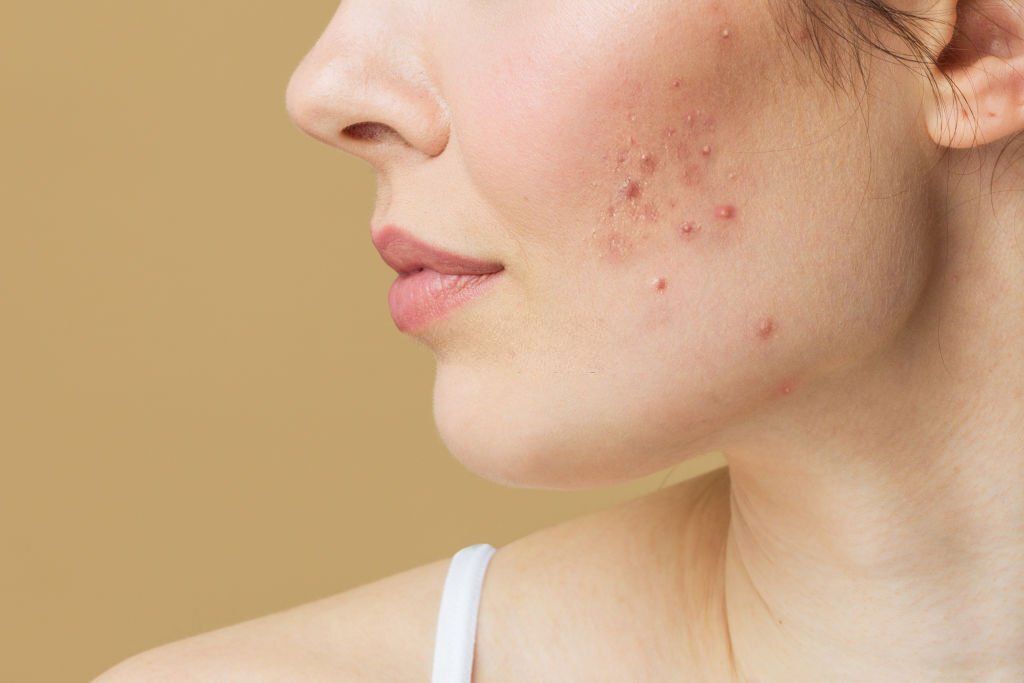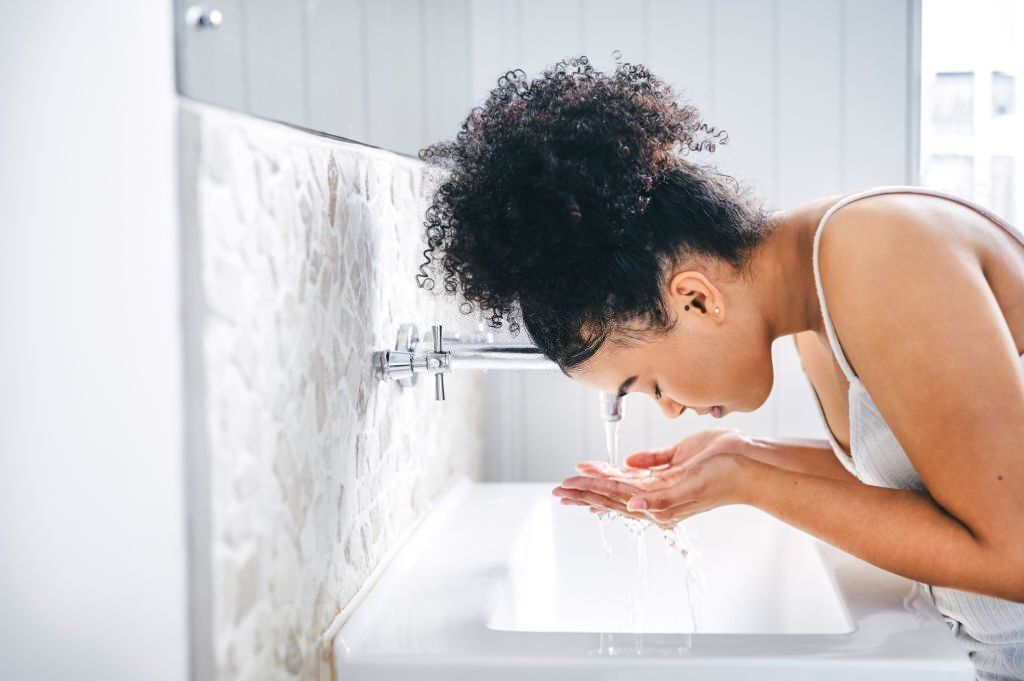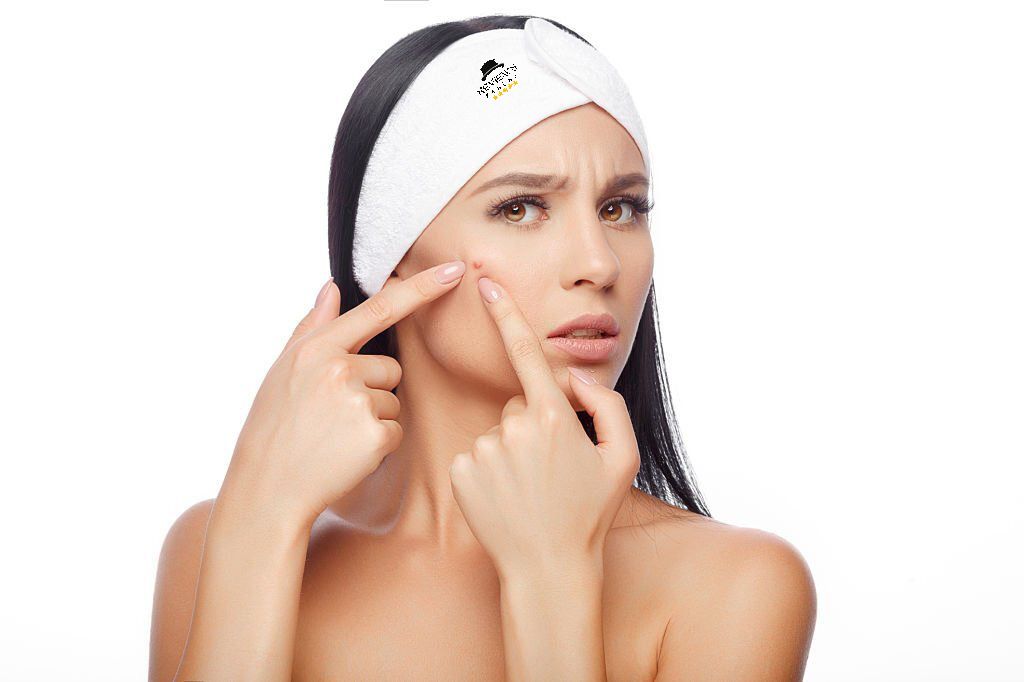The typical difference between Acne and pimples is that Acne is the start of the disease, and pimples are nothing but a sign of Acne.
It is common for people to develop pimples on their skin when their oil glands become clogged or inflamed or when they have an increase in pimple-causing bacteria in their pores.
Pimples are usually a sign of Acne, and there are many types, such as blackheads, whiteheads, cysts, and others. Some home remedies and over-the-counter treatments can prevent Acne and pimples.
What Is Acne?
Acne or Acne vulgaris is an inflammatory skin condition. There are several types of Acne; one affects the hair follicles, while the other affects the oil glands on the skin.
Under the skin, the pores are connected to oil glands that develop an oily element known as sebum. The glands and pores are connected by a canal known as a follicle. On that canal, thin hair grows out to the skin's surface.
When sebum and dead skin cells stamp together, they form a cork in the follicle. Bacteria in the cork cause inflammation that creates pimples in Acne.
Both can occur together, and a cluster of them can be considered moderate to severe acne.
What are Pimples?
A pimple shows up when the pores become clogged by excess sebum, bacteria, and dead skin cells. Pimples are small developments on the surface of the skin.
They may become inflamed, reddish, or discolored. Sometimes, using oil-based makeup or cosmetics, if you have acne-prone skin, you may have persistent and recurring pimples.
If you have severe pimples or cystic acne, see a dermatologist for treatment. Acne usually causes pimples to develop, most commonly on the face, chest, shoulders, and upper back.
Acne vs Pimples: What's the Difference?
We mistakenly use the term acne vs pimples. Actually, acne and pimples are not something different or two different skin problems. They are the same skin problems. Just Acne is a disease, and pimples are the symptom of Acne.
Below the section, we will discuss all the positive causes and prevention ways of both pimples and Acne.
Who Can Be Affected By Pimples?
Usually, pimples happen in our teenage stage. When adolescents and young adults undergo hormonal changes, pimples start to appear.
However, pimples can affect babies; many adults have pimples into their 30s and beyond. The face, especially the nose, chin, forehead, cheeks, neck, back, chest, and upper arms, is commonplace to develop pimples.
Sometimes pimples appear on the eyelids, butt, ears, scalp, armpits, and external genitals such as the penis or labia.
Reason For Acne And Pimples

Researchers are not sure what are the exact reasons for Acne. However, they have identified some common causes that affect almost all who suffer from Acne.
Hormonal Changes
A woman's puberty, pregnancy, and menstrual cycle are the most common cause of Acne.
Squeezing existing pimples
It generates more pimples.
Scrubbing
Cleaning or scrubbing the skin or face too vigorously develop more Acne or pimples.
External Pressure
Uncomfortable pressure on collars, hats, helmets, and backpack straps can damage the skin and develop pimples.
High Humidity
Climate change or weather change between summer and winter can cause Acne.
Non-Branded Cosmetics
Low quality cosmetics, excess use of cosmetics can lead to Acne or pimples. These can produce extreme blackheads on the face and back.
Medications
Corticosteroids and anabolic steroids can sometimes cause Acne.
Symptoms Of Pimples and Acne
There are different symptoms of Acne. Some common signs include:
Blackheads
Open plugged pores. Open pores on the skin contain excess oily substance and dead skin. Dead skin cells clump and plug the open pores on the skin's surface by creating blackheads. Squeezing blackheads may increase the number of pimples.
Whiteheads
Closed plugged pores. These are lumps that remain closed by oil and dead skin. They plugged open pores under the skin's surface. They look white or yellowish in appearance. White heads are also called non inflammatory pimples.
Papules
Small, tender red or pink bumps.
Nodules & Cysts
Large, painful pus filled lumps deep under the skin's surface. Sometimes these can turn into painful lumps.
What Causes A Pimple and Acne To Form?
Sometimes, the skin gets irritated by external things it comes in contact with, and skin problems develop. Oil glands are located all over our bodies. Clogs or inflammation in our oil gland causes pimples to form. Clogs and inflammation can occur by
- Increased sebum or oily material produced by the sebaceous gland.
- Abnormal development of keratin- the protein that helps make your hair, skin, and nails.
- An increased presence of bacteria on your skin causes pimples.
Treatment Of Pimples And Acne
Some general and oral medications can get rid of semi-mild cases of pimples. Some treatment options include:
Azelaic acid
This is a natural acid that can be found in barley, wheat, and rye. It helps to kill microorganisms on the skin and reduces swelling. The common form of this acid found in the market is azelaic acid gel. It helps to prevent hair follicles from clogging.
Benzoyl peroxide cleanser
This is available as Benzoyl peroxide cleanser and PanOxyl. More down concentrations and cleansing formulations are less irritating to the skin. Especially good for oily skin.
Topical Retinoids
Retinoids, such as Retin-A, Tazorac, and Differin, help prevent clogged pores. Using retinoids every other day or using azelaic acid and retinol simultaneously as a moisturizer and cleanser can reduce pimples.
Salicylic acid
This is available as a cleanser or lotion. It helps remove dead skin cells to prevent the hair follicles from clogging.
You should visit a healthcare provider if these steps don't help you. They may provide some recommended certain medications, antibiotics, or medical tests to treat acne.
Some other Acne and Pimple Treatment Methods
Chemical peels
A mild chemical solution to remove layers of skin and reduce pimples.
Laser skin resurfacing
Short, concentrated, intense pulsed light therapy or photodynamic therapy at the pimples. It helps to reduce the amount of excess oil that the sebaceous glands produce.
The microdermabrasion process
A dermatologist uses a specialized instrument to "file" your skin. Removing the top layers of your skin releases the clogs that cause pimples.
But these are only provided by a healthcare provider or skin care doctor. Don't try these on your infected and inflamed pimples without consulting with a doctor. These may irritate your skin and make Acne worse.
Do Home Remedies Work in Preventing Pimples?
Several home remedies may help in pimple and acne treatment. Our grandmothers have offered us different kinds of home remedies for Acne for centuries. They believe pimples can be treated at home.
They are not wrong; some home remedies effectively treat pimples at home as well as bless us with healthy skin.
Tea tree oil
It can prevent or stop the growth of bacteria in Acne. Apply a little tea tree oil on a cotton pad and rub it gently on pimples. This special oil is also beneficial for other ongoing skin conditions.
Sugar or salt scrubs
This powerful combo is a traditional skin cleanser that works like magic on pimples. These scrubs exfoliate dead skin cells on the skin. Wet your face, apply salt or sugar with honey, make a scrub pack, and gently massage the skin in circular motions. Wash the face with warm water.
Green Tea
Wet green tea leaves can reduce oil production in your skin. Mix green tea leaves with water and apply the leaves to the skin in small, circular motions for up to 30 seconds. Moreover, green tea can also provide us a remedy for any underlying disease.
Warm compress
A warm compress increases blood flow to the pimples, which can heal them faster. Use a clean washcloth or small towel in warm water and apply it to the pimples area.
Ice
Ice can slow down inflammation and pain. Apply an ice cube covered in a cotton cloth over your face for at least 10 minutes. Apply ice two to three times a day.
Prevention Ways Of Acne

There are many self-care steps you can follow to prevent Acne.
- Wash your face with lukewarm water and use a mild facial cleanser or face wash.
- Use non-comedogenic makeup, non-comedogenic sunscreen, and non-comedogenic oils.
- Avoid squeezing blackheads or picking at blemishes.
- Avoid touching your face with your dirty hands.
- Maintain a healthy diet, and avoid skim milk and food products enriched with vitamins and minerals.
- Check the expiration dates of all of your skin products.
- Use skin products according to your skin type. Understanding the exact nature of your skin concerns is crucial to its effectiveness.
- Less use of oil-based products on the skin.
- Wash your Hair properly and regularly.
- Clean your makeup brush regularly. There are some bacteria present in your makeup kit.
Food And Drinks To Reduce Pimples
Sometimes, doctors or researchers suggest that certain foods contain elements that can increase the growth of pimples. Such as skim milk, whey protein, sugary food, chocolate, etc., but these may not always be true. According to the National Institute of Arthritis and Musculoskeletal and Skin Diseases, stress, "dirty" skin, greasy foods, and chocolate do not actually cause acne.
- Vitamin A: Good sources of vitamin A are green and yellow vegetables, tomatoes, fruits, fish, and liver.
- Vitamin D: Sunshine vitamin. Good sources of vitamin D are dairy and non-dairy milk, fatty fish, breakfast cereals, and orange juice.
- Vitamin E: Good sources of vitamin E are seeds, leafy green vegetables, and vegetable oils.
Frequently Asked Question
Question 1- Are Pimples Common?
Answer 1: Yes, Pimples are common. Some researchers suggest that pimples can affect almost everyone at some stage of their lives. But it is ubiquitous in adolescence and can permanently disappear in adulthood.
Question 2: Is Acne contagious?
Answer 2: No, pimples or Acne aren't contagious. One can't spread them to another person through skin-to-skin contact.
Question 3 - How long does a pimple last?
Answer 3- Pimples usually last three to seven days. Most go away on their own, but sometimes it may take a longer time. Deep pimples that grow under your skin with no head may take a few weeks to go away.
Question 4 - Zit Vs Pimple: What makes them Different?
Answer 4: Pimples are caused by hormonal changes and blocked skin pores, while Zits are breakouts due to clogged melanin and oil glands. Most of the zits occur due to overthinking, stress, and anxiety. Pimples and zits are acne lesions that form when dead skin cells, oil, and bacteria clog the pores of the skin.
Question 5: What is the difference between whiteheads and blackheads?
Answer 5: Blackheads and whiteheads are both forms of Acne. Blackheads appear dark and exist on the skin's surface, while whiteheads are white and form a white head above the skin.
Question 6- How to get rid of whiteheads overnight?
Answer 6: No, there is no way to reduce whiteheads overnight. Instead, you can use warm steam, honey, lemon juice, and tea tree oil at home to treat whiteheads.
Takeaway
Compared to a regular pimple, acne is more persistent and sometimes painful, with multiple breakouts emerging on the skin's surface.
Although pimples don't seriously affect your physical health, they can affect your psychosocially and psychologically - how you perceive yourself and behave. Anxiety, depression, mood disorders, and suicidal thoughts are sometimes related. Therefore, avoid oily foods, don't stress, drink plenty of water and yes, maintain good hygiene. You will stay free from pimples for eternity.


